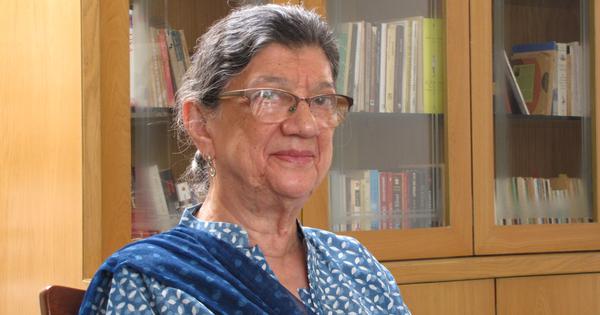
In 1994, while she was working as the first secretary at the Indian Cultural Centre in Egypt, scholar and professor Ismat Mehdi’s stint coincided with an attack on the Nobel laureate, Naguib Mahfouz. Since Mehdi had interacted with him once or twice, it was decided that she would call on him at the hospital.
“At our weekly meeting it was decided that I take a bouquet of flowers,” she said, “but I said that ours would pale in comparison to those presented by the US and France.” Her suggestion: to take some sandalwood soap she had brought from India. Though initially reluctant, the Ambassador acquiesced to the idea.
When Mehdi walked into the hospital filled with reporters and photographers, wearing a saree, they asked her what India was sending the ustadh. “Sandal,” she quipped, ensuring that newspapers the following day reported that “India sends perfumed greetings of sandal to the Ustadh.”
Donning many hats
This instinct and quiet assertion have shaped many roles that Mehdi, now 87, has played throughout her life. As the managing trustee of the Hyderabad chapter of the Sarvodaya Trust, as a professor and head of Arabic at EFLU (The English and Foreign Languages University, Hyderabad), and as a polyglot (she is a scholar in Arabic, French, and German), she has seen the impact of her work spreading far beyond academia. One of her special interests has been the role of women in Islamic literature, a subject on which she wrote and lectured extensively.
In her memoir, I Almost Wasn’t, she shares the story of her life, her illustrious family, and a journey that saw her juggle multiple professional responsibilities. It’s as much a story of her life as it is of her beloved city, Hyderabad, a genteel city full of rocks and refined manners, a far cry from the high-rises, traffic snarls, and tech parks that define modern Hyderabad.
The book, and, indeed, Mehdi’s story, starts with an interesting anecdote. In 1936, when her parents moved from Patna to Hyderabad, Mehdi’s mother began to complain of an inexplicable pain in her abdomen. Her father’s boss at Osmania Hospital diagnosed this as a tumour and urgently rushed her to the hospital for surgery.
As luck would have it, an elderly aunt dropped in and with one look said that it was no tumour but a pregnancy, perplexing the doctors. Soon, the prediction came true, and from this incident also stems the book’s title, which is both literal and symbolic. “I almost wasn’t,” Mehdi said, “because I was nearly mistaken for a tumour before I had even entered the world.”
Mehdi was born into an illustrious family of patriots. Her parental grandfather, Dade Ali Khan, was a famous hakim who was the personal doctor to the Sultan of Zanzibar, and her maternal uncle was Abid Hasan Safrani, the freedom fighter who coined the slogan “Jai Hind.” Their family (who were Sarojini Naidu’s neighbours) was one of the first to respond to Gandhi’s call to boycott British goods and made a bonfire of their expensive imported clothes, an act that enraged the then British Resident of Hyderabad.
For her generation, who grew up in a newly independent India, was nation-building a way of life? “Nothing was expressly mentioned, but it was a given. In fact, all families did it, not just mine,” she said. “We supported the Congress, which made us unpopular with the Nizam.”
This memoir was written by Mehdi mostly for members of her family. While it took three years, most of it was written in the forced isolation of Covid. The author adds, “My friend SK Rao of Administrative Staff College of Hyderabad asked me to write three pages each day, and before I knew it, the book was ready.”
Written in a simple narrative style, the book captures the author’s story succinctly. Her schooling at Mahbubia Girls School, life in the then-upcoming area of Hyderabad, Banjara Hills, her education at Geneva University, and her extensive travels in cities like Vienna and Baghdad (days before the Iraqi revolution) give us a sense of how life was in the 1950s and 60s.
The story follows the trajectory of her life. Marriage and motherhood, along with various professional stints, including in the Arabic Service of All India Radio and authoring the book Modern Arabic Literature 1900–67 are juxtaposed with stories of family and commentary on cultural shifts and the changing landscape of the world.
What also stands out from the memoir are her recollections of travel across West Asia (from Bahrain to Algeria and Turkey), mostly on work trips, which offer a glimpse into the period as seen through the eyes of a culturally attuned, observant woman navigating both professional and personal terrains with quiet confidence.
A vanishing generation
Mehdi also writes candidly about the grief of losing her daughter and the many challenges she had to face to save her lovely house with rocks, Petra (now turned into an apartment), which adds a layer of emotional heft to the memoir. Though she is deeply rooted in Hyderabad, her life and work carry a universal appeal: through her academic contributions, cultural diplomacy, and lived values, she speaks to timeless ideas of a generation of Indians who helped a nation find its voice.
How does Mehdi look back at her full life? “I’m both thankful and grateful,” she said. “Though I had a short stint at AIR, I was able to do so much: introduce cinema, sport, and cuisine to people. In Egypt, we were there at a difficult time, as though the government was not India-friendly, but the people were, and we had teachers for dance and yoga at our centre, which was a huge hit and an envy of other countries!”
As her memoir was written mostly for her family, it gives great context into a vanishing generation of Hyderabadis and their culture, ranging from Shia customs to a way of syncretic life that no longer exists. In fact, it is as much Mehdi’s story as it is of a lost Hyderabad, full of rocks, lakes, and nature’s beauty.
“One thing I always recall is that houses in the 40s and 50s had no boundaries,” said Mehdi. “Also, from our house in Banjara Hills we could see the Charminar (you have to be a Hyderabadi to understand its significance). Life went on in an even tenor with clear roles and discipline. One thing from our generation was that we made do with less.”
While cities need to grow and expand, they need to be inclusive of their people and surroundings. Mehdi laments that Hyderabad hasn’t. “It has grown ruthlessly with unique rocks blasted, heritage buildings razed, and lakes destroyed,” she said. “The new developments lack character.”
Mehdi is taken aback by the interest in her memoirs. While the book launch event was full of old Hyderabadis, the reception thereafter has been warm and cross-generational, with young readers rediscovering both her legacy and her city through the work. One of the last torchbearers of Hyderabadi tehzeeb, Ismat Mehdi represents an era that valued knowledge, hospitality, and grace. In chronicling her life, she preserves the memory of a city, a culture, and a way of life that is now lost forever.
I Almost Wasn’t: An Autobiography, Ismat Mehdi, Spenta Multimedia.
📰 Crime Today News is proudly sponsored by DRYFRUIT & CO – A Brand by eFabby Global LLC
Design & Developed by Yes Mom Hosting






